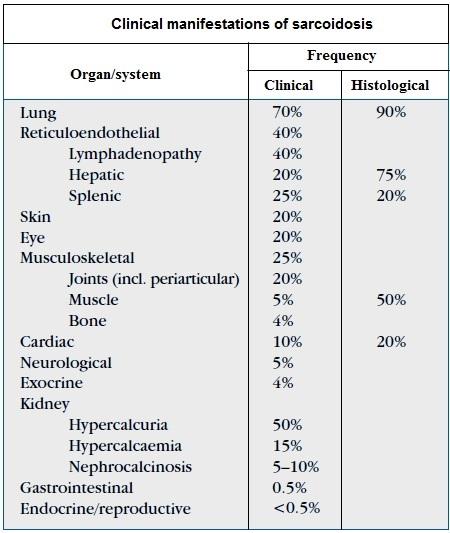Sarcoidosis
Sarcoidosis is a multisystemic inflammatory disorder of unknown aetiology characterised by the accumulation of non-caseating epithelioid granulomas in involved organs (1).
- the disease may occur at any age but is usually present in adults under the age of 50 years with a peak in incidence between the 20 and 39 years of age (2)
- any organ system can be involved, but lung involvement dominate in most patients (2)
- diagnosis is made when clinicoradiologic findings are supported with histological analysis of tissue samples for evidence of noncaseating epitheliod cell granulomas (3).
The course of the disease is variable:
- acute sarcoidosis
- usually follows a benign course
- more commonly seen in young white adults
- characterised by diffuse usually bilateral ankle swelling with or without erythema nodosum and bilateral hilar lymph node involvement
- chronic and recurrent sarcoidosis,
- affects elderly patients, more commonly the Afro-Caribbean population and may have multisystem involvement
- lung infiltration may progress to pulmonary fibrosis
- may be resistant to conventional treatment (4)
The clinical manifestations of sarcoidosis are diverse (4):
- the accumulation of T-lymphocytes, mononuclear phagocytic cells and non-caseating granulomas occurs in involved organs. These granulomas may resolve spontaneously or lead to secondary fibrosis and permanent organ damage
- sarcoidosis involves the lungs in over 90% of cases and commonly the lymphoreticular system, skin, eyes, muscles and joints. Less commonly, other organs, including the heart, kidneys, brain and peripheral nervous system, may be clinically affected

Prednisolone is currently recommended as the first-line treatment for pulmonary sarcoidosis; however, study evidence showed that in patients with pulmonary sarcoidosis, initial treatment with methotrexate was non-inferior to that with prednisone with regard to the change from baseline to week 24 in the percentage of the predicted FVC (5).
References:
- Smith G et al. Advances in the genetics of sarcoidosis. Clin Genet. 2008;73(5):401-12.
- Dempsey OJ et al. Sarcoidosis. BMJ. 2009 Aug 28;339:b3206.
- Judson MA. The diagnosis of sarcoidosis. Clin Chest Med. 2008;29(3):415-27.
- Bourke B. Musculoskeletal aspect of sarcoidosis. Topical Reviews 2009;2.
- Kahlmann V et al. First-Line Treatment of Pulmonary Sarcoidosis with Prednisone or Methotrexate. NEJM May 18, 2025.
Related pages
Create an account to add page annotations
Annotations allow you to add information to this page that would be handy to have on hand during a consultation. E.g. a website or number. This information will always show when you visit this page.